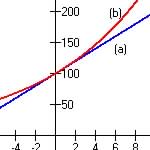Linear growth occurs at a constant positive amount each period while exponential growth occurs at a constant percent increase each period.
(a) P = -100t + 5000, linear function since decreases at a constant amount of 100 each year from 5000.
(b) P = 5000(0.92)t , exponential since decreasing at a rate of 8% or r = 0.08 year from 5000.
(a) P = 10t + 100, linear function since increasing at a constant amount of 10 each year from 100.
(b) P = 100(1.10)t, exponential function since increasing at a constant percent rate of 10% each year from 100.
(c) Graph of both functions

If linear constant amount change  and if exponential constant
ratio change
and if exponential constant
ratio change  .
.
f(x) increases at a constant amount, 0.87965 each change is x, so f(x) is linear.
g(x) change by a constant ratio each successive g(x), e.g.  , so g(x) is exponential.
, so g(x) is exponential.
h(x) is neither linear nor exponential since above rule does not apply.
Ans. : 
(0, 1) and (2, 100)
Ans. : 


